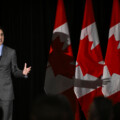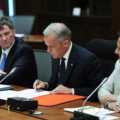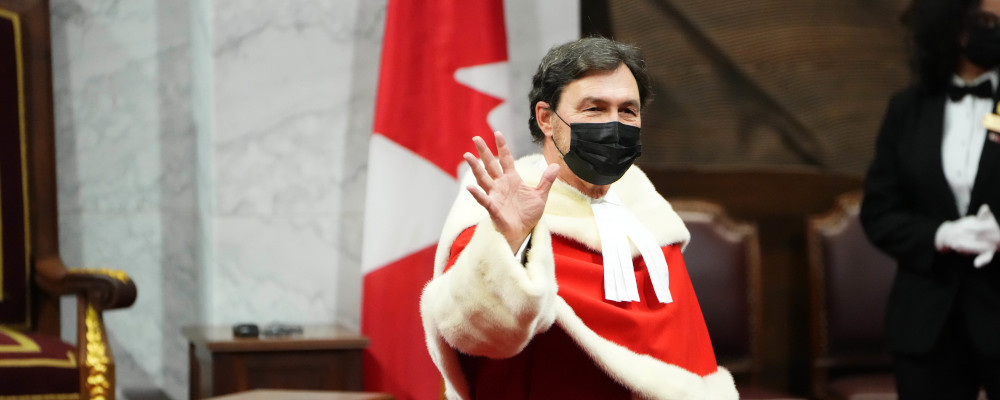The elevation of Ketanji Brown Jackson to the U.S. Supreme Court as the first Black and only sixth female justice represents an historic milestone. As I watched part of her questioning by the Judiciary Committee, I came away impressed with her poise, intelligence, sense of humour, and fairness. There seemed to be little doubt about her qualifications, yet her confirmation was far from certain.
The unfounded attacks by Republican Senators and distortion of her record as a judge were painful to watch. Senator Murkowski, a voice of reason, said that her decision as only one of three Republicans who voted to affirm partly rested on her rejection of “the corrosive politicization of the review process for Supreme Court nominees, which on both sides of the aisle, is growing worse and more detached from reality by the year.”For Murkowski, the decision to support Jackson came amid a fraught political campaign.
There can be little doubt that Jackson is highly qualified based on her training, qualifications, and record. While her appointment provides much needed balance to the court, it is her overall standing, skills, and record that justifies her confirmation.
There was a time when approval of qualified justices was nearly unanimous regardless of the perception of whether they were more liberal or conservative. In 1986 Antonin Scalia was confirmed unanimously by the Senate in a 97 to 0 vote and In 1993, Ruth Bader Ginsberg was confirmed by a 96 to 3 vote. These two justices often represented polar opposites in their viewpoints, yet were great friendsWhat we can learn from Ginsburg’s friendship with my father, Antonin Scalia by Eugene Scalia and admirers, even in dissent.
Confirmation to the court is not guaranteed. Since the founding of the Supreme Court in 1789, presidents have submitted 165 nominations for the CourtSupreme Court Nominations (1789-Present) and of these 127 were confirmed and seven decided not to serve. Some nominations were rejected because of the quality of the nominee and a number because of partisan concern about how they might vote on key issues. The purposeful delay in voting on the highly qualified Merrick Garland to fill the vacancy created by Antonin Scalia’s death and Neil Gorsuch’s ultimate confirmation by a new president further poisoned the process. Democratic Party suggestions to expand and pack the court with their nominees are equally damaging.
An independent, fair and balanced judiciary is a cornerstone of democracy. It provides an important check on the executive and legislative branches of government and is the arbiter of the law of the land.
To date, the process of Supreme Court appointments in Canada is based on merit, with little controversy. The prime minister, with advice from legal experts, considers proposed qualified nominees and sends their selection to the Governor General for approval. There is no mandated debate or House of Commons vote, however, the process works because of the history of relatively apolitical appointments.
Justice Michael Moldaver has announced that he will retireSupreme Court Justice Michael Moldaver to retire Sept. 1 on Sept. 1, close to the mandatory requirement age of 75. Prime Minister Trudeau has initiated a selection process by appointing Wade McLaughlin to chair the Independent Advisory Board For Supreme Court of Canada Judicial Appointments. The deadline for applications is May 13 and the prime minister will choose from the shortlist submitted. Kudos for maintaining a process based more on merit than politics.
Moldaver said that he has served with chief justices who are “persons of honour and integrity, courage and vision, who share a passion for justice and a fervent commitment to maintaining the rule of law.”
In Russia and China, the judiciary is simply the puppet of the repressive and restrictive governments that appoint them. In democracies, our courts need to remain independent to uphold our freedoms and the rule of law. While the process in the U.S. is subject to corrosive politics, let’s hope that the workings of the Court are carried out by passionate defenders of the law, without personal bias and with a collaborative awareness of the importance of their rulings on the fabric of society.
Recommended for You

Peter Menzies: Justin Trudeau’s legislative legacy is still haunting the Liberals

Michael Geist: The government’s stunning new assault on Canadians’ privacy

Ginny Roth: The Hockey Canada trial exposes our bereft sexual ethics

‘A blinking warning sign’: Joanna Baron on why ‘bubble zone’ laws are the wrong way to protect Canada’s Jewish community



